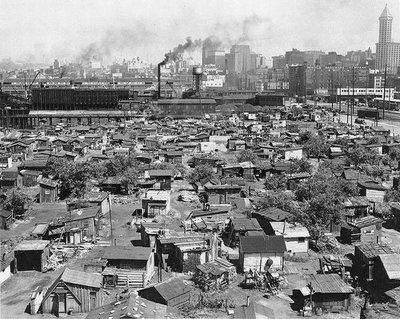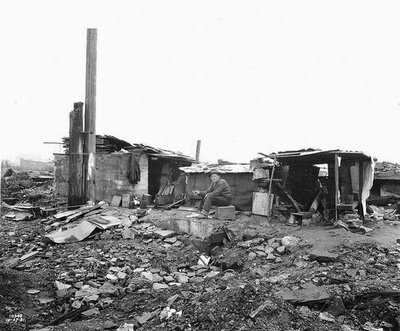February 4, 2010
UW students recreate story of Great Depression that transformed Washington
With the escalation of the “great recession” a year ago, UW historian James Gregory started getting telephone calls asking him to compare it to Great Depression of the 1930s. He wondered if students would be interested in doing research projects about the Depression. The answer was a resounding “yes.”
The fruits of that research by nearly 80 UW students and several faculty members are now available to the public to browse through on the Web. Visit online here.
“If you scratch any surface in the state you will come across changes from the 1930s that shape our world. It was a key decade for America in the 20th century and it was pivotal for Washington,” Gregory said. “The Depression hit Washington harder than most places in the country. Unemployment reached 35 percent in the state and was even higher in Seattle. The economy was shattered. An enormous Hooverville, a shanty encampment for homeless men, sprang up, sprawled over nine-and-a-half acres near what is now Quest Field and persisted from 1931 until l941.
“But under the New Deal federal spending transformed Washington. Modern transportation and electrical infrastructure was created and was a key to the manufacturing boom seen in World War II. It changed an economy that had been based on timber to one of airplanes and urban manufacturing,” he said.
The new Web site is collaboration between Gregory’s undergraduate and graduate students and the UW School of Drama. Key participants include Jessie Kindig, a history doctoral student who serves as project coordinator; School of Drama Director Sara Nash Gates and drama professor Mark Jenkins; and Sarah Guthu, a drama school graduate student who wrote much of the extensive theater content on the site. Gregory directs the project.
More than 40 papers researched and written by students about the Depression are now on the Web site and more are on the way. Some still need editing and art to illustrate them, and a new group of students is at work on new related projects for the site.
Gregory and Kindig said it is difficult to find areas of society that were not altered by the Great Depression and the New Deal. The era saw Republican Washington transformed into a Democratic state, the beginning of political activism that would later affect the civil rights and farm workers movements in the state, and the organizing of the unemployed, which boosted the labor movement. And everywhere in the state there are hundreds of buildings that were funded by the federal government.
“The impact on the arts in Washington was a hidden story,” said Kindig. “The arts just wouldn’t be the same.”
Federal funding supported a wide swath of the arts and Washington was the home of some of the most innovative theater, musical and performance art works in the nation. Two of the iconic artists of depression era, photographer Dorothea Lange and songwriter Woody Guthrie, worked in the state. Lange pointed her camera at migrant farm workers in the Yakima Valley and Guthrie was commissioned to write songs that extolled public utilities and the dams on the Columbia River including Roll on, Columbia, which became the state song.
The drama school will present staged readings of two depression era plays in the Jones Playhouse. Clifford Odets’ working class drama Waiting for Lefty, directed by Andrew Tsao, will be performed at 7:30 p.m. Feb. 18-20 and at 2 p.m. Feb. 21. S.N. Behrman’s satirical End of Summer, directed by Mark Jenkins, will be staged at 7:30 p.m. Feb. 25-27 and at 2 p.m. Feb. 28. For more information on the plays, click here.
The new Web site is part of a collection of Pacific Northwest Labor and Civil Rights Projects based at the UW and was funded by a grant from the Simpson Center for the Humanities at the UW.
The Depression also sparked changes at the UW. Federal funding made it possible for poor students to begin attending college in the mid 1930s. Meanwhile, faculty members formed a union on campus. It was initially ignored by the administration, but eventually the Faculty Senate was created and a code for shared governance was approved by the end of the decade.


